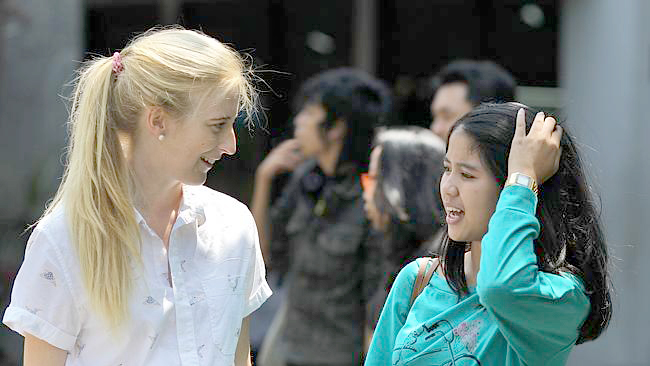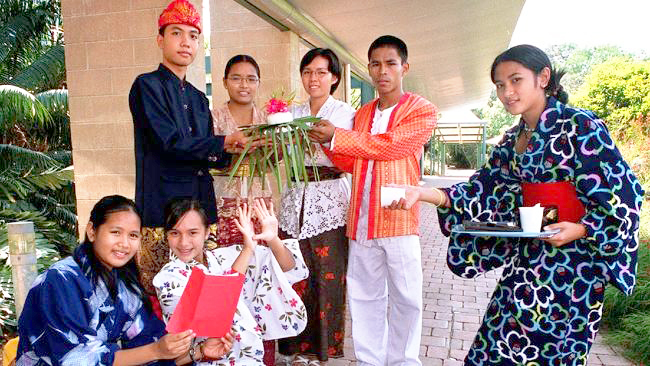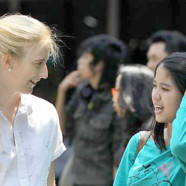Jokowi Effect in Aussie Student
ACICIS reports boom in study travel to Indonesia in ‘Jokowi effect.
The Jokowi effect appears to be helping to rekindle the interest of Australians in our northern neighbour and boosting outbound study travel, says Indonesia expert David Hill.
Record numbers of students have signed up to go to Indonesia next year as part of a study abroad consortium founded by Professor Hill from Murdoch University.

ACICIS student Iona Main (left) with friend Yunita Capriati at Parahyangan Catholic University in Bandung, Indonesia. (Photo: James Walsh)
“Funding (under the government’s New Colombo Plan) is a factor, but I think it’s also a return of confidence and interest in Indonesia,” he said.
He cited the novelty of Indonesia’s new President Joko “Jokowi” Widodo, coupled with a longish period of stability after past terror attacks and riots.
“Jokowi is a very attractive figure (and this) has meant we’ve had very positive stories about the nature of democracy in Indonesia,” Professor Hill said.
In February, the Murdoch-based Australian Consortium for “In-Country” Indonesian Studies will send 76 students on semester-long programs to Indonesian institutions including Gadjah Mada University in Yogyakarta.
Another 74 students from Australian universities will leave in January for six-week short courses, including a new business practicum in Jakarta.
Both figures are records for ACICIS, which celebrates its 20th anniversary next year.
Professor Hill said the consortium, which has 23 member universities, was “absolutely ecstatic”.
“It’s taken us more than a decade to get back to the sorts of figures we had before the (2002) Bali bombing,” he said.
Confidence in study travel to Indonesia had already been shaken by riots and unrest in 1998 as the Suharto regime unravelled.

The New Colombo Plan, comprising a scholarship and a mobility program, provides opportunities for Australian undergraduate students to undertake overseas study.
Professor Hill said next year’s bumper crop of ACICIS students also had a lot to do with the high-profile funding of the New Colombo Plan, which has been spearheaded by Foreign Minister Julie Bishop.
Unlike the previous AsiaBound study travel scheme, New Colombo is open to university consortiums, enabling ACICIS to apply for mobility grants and distribute them among its members.
On Monday, the government announced grants for more than 3000 undergraduates to go to 32 destinations in the Indo-Pacific region next year. Indonesia was one of four New Colombo pilot locations this year.
Assuming whichever party was in government kept up New Colombo, Professor Hill said he expected study travel to Indonesia would keep growing.
He said university enrolments in Indonesian language courses this year — an equivalent full-time student load of about 300 — were almost the same as five years ago.
But the share of study done in Indonesia, rather than in Australia, had roughly doubled to 20 per cent between 2010 and this year.
“More students wishing to learn Indonesian are doing part of that, at least, in Indonesia,” he said.
Professor Hill said ACICIS would like to offer students the chance to study in other cities of the archipelago, and not just in Java, but lacked the funds.
Although the consortium had been praised by government, its request for recurrent funds to maintain and expand its network had so far fallen on deaf ears.
ACICIS employs a Yogyakarta-based director and this month leased a proper office in Jakarta after a long period of makeshift arrangements.
Source: Bernard Lane / The Australian

